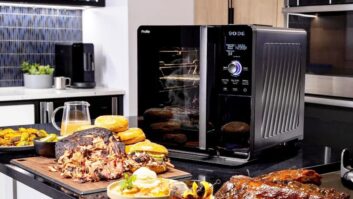
Editor’s note: This is an excerpt from the exclusive interview conducted by John Eggerton for our sister site, Multichannel News. Visit Multichannel news for the entire exclusive interview and McDowell’s experience surviving COVID-19.
When communications attorney Robert McDowell started feeling a little under the weather last month, he chalked it up to seasonal allergies and related bronchitis and got the usual antibiotic from his primary care physician. Then his symptoms worsened.
It wasn’t seasonal allergies.
After a trip to the hospital and back home again, the former FCC commissioner was re-admitted with what turned out to be COVID-19-related double pneumonia.
Throughout the arc of his escalating illness he was tweeting occasional status reports that had his many friends in Washington communications circles concerned, then emailing each other with many questions and no answers as his tweets stopped for several days. His silence was understandable in retrospect.
Still regaining his strength (he lost 12 pounds during the ordeal) and with a slight cough and what he calls a “shipwreck survivor” beard — he declined to provide photographic evidence — a gratefully recovering McDowell talked with Multichannel News in an exclusive interview on those harrowing times and how he eventually made it home.
In a scene straight out of a Hallmark movie, that homecoming was marked by a double rainbow (see photo), a return he credits to the prayers and support of his friends, timely Facetime telemedicine from a lifesaving doctor outside the hospital, continuity of care from another lifesaving doctor inside the hospital, and some serious self-advocacy.
MCN: When did you first notice symptoms?
McDowell: It was March 14. I felt like I had my usual allergy-induced bronchitis, which I get every couple of years. I called my doctor and she put me on Azithromycin [an antibiotic] as usual. I took the normal cold decongestants.
MCN: Walk us through how this escalated from “oh, this is seasonal allergies” to making burial arrangements.
McDowell: I felt OK, like I had bronchitis, but I was totally functional March 14 and 15. On March 16 or 17 I sprouted a mild fever, which, again, isn’t unusual when I have bronchitis. But in the back of my mind I was thinking: “I’ve been on antibiotics for three days. This shouldn’t be happening if I am on antibiotics.” But other than that I felt fine, though a little bit slowed down.
On the 17th, St. Patrick’s Day, my son reported that his friend, who had been a houseguest of ours March 6-8, had tested positive for COVID. I was grateful to him for getting tested and letting us know. He deserves a gold medal for that.
MCN: And then the light began to dawn?
McDowell: That prompted me to call my doctor back, Dr. Connie Le. She’s fantastic and a hero in this whole story, big time. She saved my life.
She had me come in — it is now March 18 — and they arranged, after a lot of work over a few hours, to get me tested at an Arlington County Health Department drive-through COVID testing center. [Arlington is one of the Virginia counties with the highest incidence of COVID-19.] It was very difficult to get. It was their first day of operation. I got a throat swab like you get for a strep test.
I got more congested and an increased cough, so I Facetimed Dr. Le on March 20 — at this point we were only seeing each other via Facetime — and she saw something she didn’t like.
MCN: So, this clearly demonstrates the value of telemedicine and connectivity?
McDowell: Yes, this was the mobile internet. Thank goodness for all those spectrum auctions I helped promote.
So, Dr. Le sees something she doesn’t like on Facetime and says: “You’ve got to go to the ER.” I protested, saying “Look, I feel fine. I just have an increased cough and increased congestion.” But during the week my temperature had been starting to yo-yo from normal to 103, then back down to 99 and then 101.5, then normal again.
MCN: Were you thinking COVID-19 yet?
McDowell: Yes, but I’m thinking I don’t need hospitalization. I’m a healthy 56-year-old, I go to the gym. I run, I don’t have any of those compromising conditions. So, technically I guess I was in denial. But thankfully my doctor had an amazing ability to perceive something over Facetime. There was nothing obvious that I knew, but she saw something. Maybe it was a sixth sense.
MCN: Did she tell you what she saw?
McDowell: I didn’t ask her to try and deconstruct it because I didn’t want to bug her. I knew she had a lot of other patients. I will someday, though.
She sent me to the ER just before midnight Friday night the 20th. They took a chest X-ray and found a spot of pneumonia in my left lung. I have never had pneumonia before. And, that’s kind of serious, so you’re thinking: “I’ve got COVID-related pneumonia.” Remember I’m still not officially diagnosed because the test results aren’t back [they would ultimately confirm it was the virus]. The hospital gave me their own COVID test at that point.
So, they put me in a normal hospital room. I was not yet getting oxygen at this point.
On Sunday, March 22, the doctor in charge, they are called “hospitalists,” who I never saw or met and who did not examine me — he was keeping track of my numbers, my blood oxygen saturation level, heart rate and blood pressure — discharged me. I was happy with that, so I didn’t resist and went home.
On Monday, March 23, I was coughing more and still having a lot of congestion. Dr. Le kept asking me [again via Facetime] if I felt short of breath. I said, “well, I have pneumonia so there are times when I feel a little winded, but I am coughing, too, a lot, so what’s the difference.” She again saw something she REALLY didn’t like this time and so she called 911. She didn’t tell me or ask me. She just did it, then called my wife to say “be ready in two minutes.”
To continue reading about Robert McDowell’s experience with COVID-19, visit multichannel.com here for the entire interview. TWICE extends their heartfelt thanks to everyone working around the world in the fight against COVID-19. Stay healthy and be well!
See also: Business During The Coronavirus: Focus On What Can Be Done













